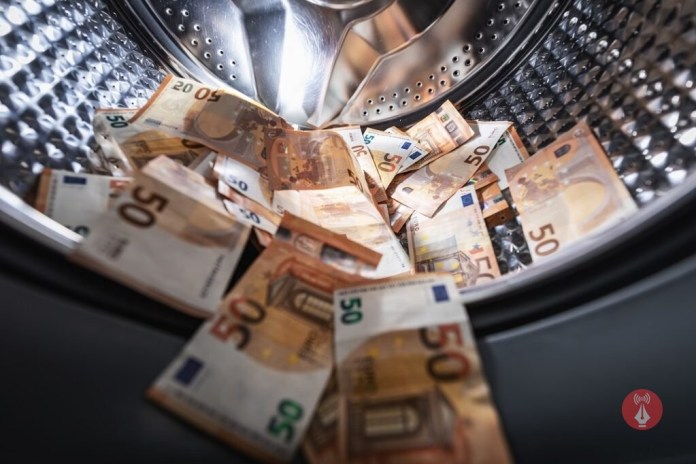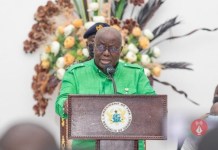A group of importers under the aegis of the Importers and Exporters Association of Ghana are zealously defending local and foreign importers accused of robbing Ghana some US$1.8 billion in under-declaration on their import returns and laundering the excess funds.
The Association’s curious defence is in spite of the fact that a cross-section of Ghanaian importers are protesting unfair favouritism at the ports, allowing some 2,000 companies to exploit the reported money laundering loopholes.
Apparently, these companies upon getting their request for Import Declaration Forms (IDFs) approved to bring in goods to the amount requested, turn around to importing much less into Ghana, but use those forms to do other imports and wire the monies to unknown destinations.
According to the anti-corruption organisation blowing the whistle on this serious case, the actions of these companies are downright criminal and in breach of Ghana’s Anti-Money Laundering Act, Act 798 as amended by Amendment Act, 2014 (Act 874).
However, in their press conference recently, the spokesperson of the Import and Exporters Association, Samson Asaki Awingobit slammed media organisations that reported the revelation of money laundering by some 2,000 importers, saying the reports “…Cast a snare on the enviable reputation of these companies whose operations impact so hugely on the country’s GDP.”
One of the names that popped up in the allegation is that ofMs. Eunice Hinneh, a top campaign financier of President Akufo Addo’s presidential campaign and the CEO of the notorious frozen foods company La Bianca Company.
Three of Ms. Hinneh’s companies, including La Bianca were named by anti-corruption group, Movement for Truth and Accountability, as one of the culprits of this money laundering scheme.
Aside from that, La Bianca has incurred discontent at the Ports because she is given broad stroke concessions that make her pay far lesser taxes at the ports and thus crowd out her competition in the frozen food import business and making Ms. Hinneh’s business the market dominator.
In October 2017, the law firm Globetrotters Legal Africa, wrote a petition to the then Director-General of the GRA, Stephen Nti, to complain on behalf of several importers whose businesses have been crippled by the preferential treatment given La Bianca.
“The wide disparity created by the grant of these values has resulted in the laying off workers threatening to push many of the members of our Client’s organization out of business due to huge losses sustained between July-September 2017,” the law firm wrote.
“For the above reason, our Clients petitions your office to revise the benchmark values by replacing them with the preferential values attached from now to December 2017 while you take steps to implement a transparent valuation system, to save the industry.”
Recently, the GRA again granted La Bianca juicy concessions in what is a re-enactment of a system that importers had complained about since 2017.
In spite of this, a group of “Mafia” importers and exporters organised a media engagement to extoll both the reputation of La Bianca as well as the companies accused of using their influence at the port to launder huge sums outside Ghana.
Whatsup News is gathering the Association may have been influenced by some powerful culprits named in the money laundering deal to hush up the stinking racket going on at the Tema Port.
Meanwhile, Whatsup News can report that the Ghana Revenue Authority (GRA) itself is has been making some damning findings on the money laundering scheme, albeit slowly.
On April 8, 2021, the GRA acknowledged the rot, pegging the amount that Ghana could be losing from the racket at US$1.8 billion annually.
In a statement signed by Florence Asante, Assistant Commissioner Communication & Public Affairs admitted that there are indeed some 1,200 companies fleecing Ghana of hundreds of millions of dollars every year by laundering monies that should have come into the country.
“In 2020, it came to the attention of the Authority that multiple Import Declaration Forms (IDFs) issued to importers have been wrongly used for other purposes. IDFs are issued by the Ministry of Trade and Industry and indicate the type, quantity and cost of goods to aid commercial banks to transfer funds and is a regulatory requirement for reconciliation with Customs Documents,” the GRA statement in the possession of Whatsup News read.
“A multi-agency team was formed in the third quarter of 2020 with members drawn from the Ministry of Trade and Industry, Ministry of Finance, GRA, Financial Intelligence Centre (FIC) & the Economic and Organised Crime Office (EOCO) to carry out investigations into the issue. The team’s initial analysis of data on record from the Commercial Banks against Customs data for the calendar year 2019 uncovered approximately 10,000 unreconciled documents from over 2,000 companies with funds transferred in the region of $1.8bn,” the GRA disturbingly confirmed.
















